Two months in lockdown, two weeks until exams. I think it’s safe to say there have been quite a few restraints on our time, movement, and interactions for the past while.
Things have changed, for sure. I think everyone has had enough time to reflect on how their lives have changed pre and post-pandemic, and how they’ve changed throughout their degree. There’s really nothing like face-to-face interaction. I know I tend to reflect a lot in these blogs. But there’s not much else to do when you’ve been holed up in your room for two months (as everyone else has). So here are a few of the things I’ve learned, in looking back at different times.
I’m so grateful I nabbed as many opportunities as I could. It’s very easy to delete an email or think you’re too busy, but you can always make time for things that happen in person and won’t repeat themselves (usually I end up ‘resting’ on my phone anyway).
So! Here are some of the highlights of face-to-face interactions I had this year offered by the University and Auckland in general.
1 – Auckland Writer’s Festival
This was amazing. Thousands of people came from across Aotearoa to see writers like Patricia Grace, Witi Ihimaera, with live Zoom sessions from Kazuo Ishiguro (Nobel laureate), and filmmaker Ai WeiWei. The list goes on – Tusiata Avia, Selina Tusitala Marsh, and Karlo Mila, Neil Gaiman, Amanda Palmer (Neil Gaiman stayed all afternoon signing books). It was at the Aotea Center, conversations that opened so many questions, and spaces outside all the ordinary thoughts we have throughout the day. Just being exposed to so many curious people, happy to listen, with no other purpose but be there, was worth it. Audiences got to ask questions and often the contributions they made were as valuable as the talks themselves. It’s hard to put into words but just being there and skimming the titles, looking at all the things others find interesting and spend their whole lives getting on the page, and then gathering in these rooms to talk about it – was such an invigorating experience. Do go if you can next year!
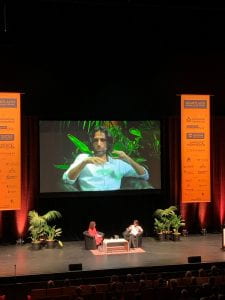
Behrouz Boochani, author of No Friend but the Mountains.
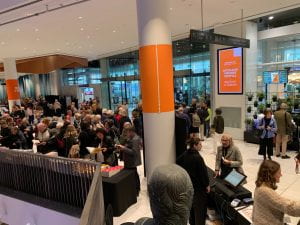
2 – Drawing sessions at the Auckland Art Gallery
This year, for a few months, the Auckland Art Gallery held drop-in drawing sessions on Fridays nights. For an hour and a half, people of all ages and probably all professions, some new faces and some regulars, gathered in the second floor to sketch a model. One night, instrumental music was played – a concert opening the back of a piano and playing the strings attached to the keys. People drew with their eyes closed. Total silence, no phones, just the sounds of pencils.
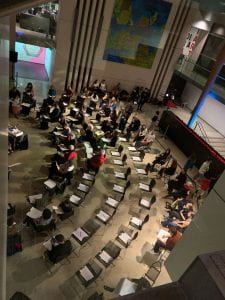
3 – Public Poetry with Youth Arts NZ and Lounge Readings at the Old Government House, UoA
Reading the pamphlets on the backs of doors can end up filling an hour and a half on a Thursday in a much more interesting way. Every few months, Lounge Readings are hosted at Old Government House. Some of Aotearoa’s most talented poets and writers take about five minutes to read something. NZ’s Poet Laureate David Eggleton has performed. As an English student, it’s great to hear people with such meaningful things to say, speaking directly from the heart, just a few metres away from you. And seeing them in person! Live! Hopefully next year, once it’s safe again and everyone is vaccinated, this will carry on – you can find out on the Arts Facebook page or keep an eye out for pamphlets all around the Humanities building.
Youth Arts New Zealand also does great work. It’s actually lead by a UoA student. What they do is run events, put creative-minded youth together from all across Auckland, create networks, and connect you to opportunities you might be interested in. Many of these are paid, and you get to meet some great people. I was lucky enough to do a public poetry event, writing poems for strangers while an artist drew a portrait. I had to talk to any person who sat across from me and write a poem based on that, for them to take home. It was so special to open up to others and hear what kind of lives they’d lived, or what they really cherished across their lives. It gave a whole new meaning to the words, “how are you?” or “tell me about yourself.” What’s even better is knowing these kinds of things are happening all across the city, by people interested in the same thing – speaking and listening. I would also recommend going to slam poetry events, even just to hear.
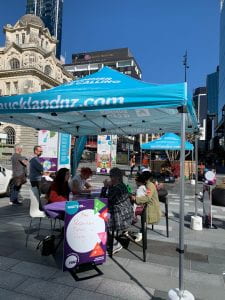
Again, these are my interests. But I know physics students and engineering students who go star-gazing with their clubs (and anyone can go), or have breakfast sessions with the top companies in their field (a programme organized by UoA for high-achieving students). Start with your degree newsletters and find out what’s happening.
7 – Whatever you can find.
This blog is getting a little long. But really, there’s so much you can do. Keep an eye out and say yes to new things. I’ve ended up at public reading sessions at the Central City Library, free movie screenings, listening to students perform with the Auckland Philarmonic, and going to Law Camp and making friends I never would have met otherwise. I’ve made fajitas in the common room of my accommodation and done all sorts of things I’m later so glad I went to. A lot of these, I find out through the Our Auckland event newsletter.
https://ourauckland.aucklandcouncil.govt.nz/events/
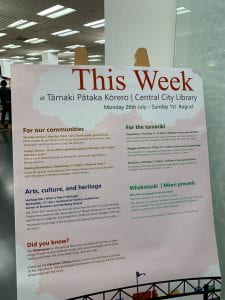
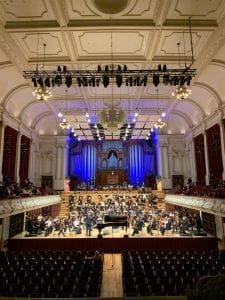
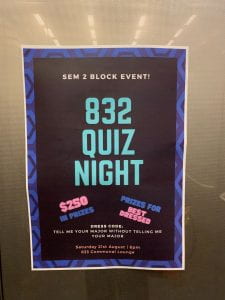
Just think of all the moments in movies outside your scheduled, paid-for, curriculum-based life or rostered days at work. The whole point of life is the stuff you do outside of it, too. And you can have interests that don’t line up – everything all goes into the mixing pot and makes for some very special days. You don’t have to go all the time. But having the memory and meeting the people and finding out what happens after is the really special part. The American physicist Leonard Mlodinow says this, “When you look at your life, if you had to sit down and think in detail, not just the headlines — if you think about all the details of what happened to you, you will find that there was a time where you had the extra cup of coffee, where if you hadn’t, you wouldn’t have met Person A. When I look back in my life, I could find so many instances like that, and I had fun tracing some of them. And the course of your life depends on how you react to those opportunities and challenges that the randomness presents to you. If you’re awake and paying attention, you will find that things happen. They might seem good, they might seem bad, but the important thing is how you reacted to it.” Carpe diem means to seize the day – Google says ‘without little thought to the future,’ but I think that’s exactly what ends up giving you a better future.